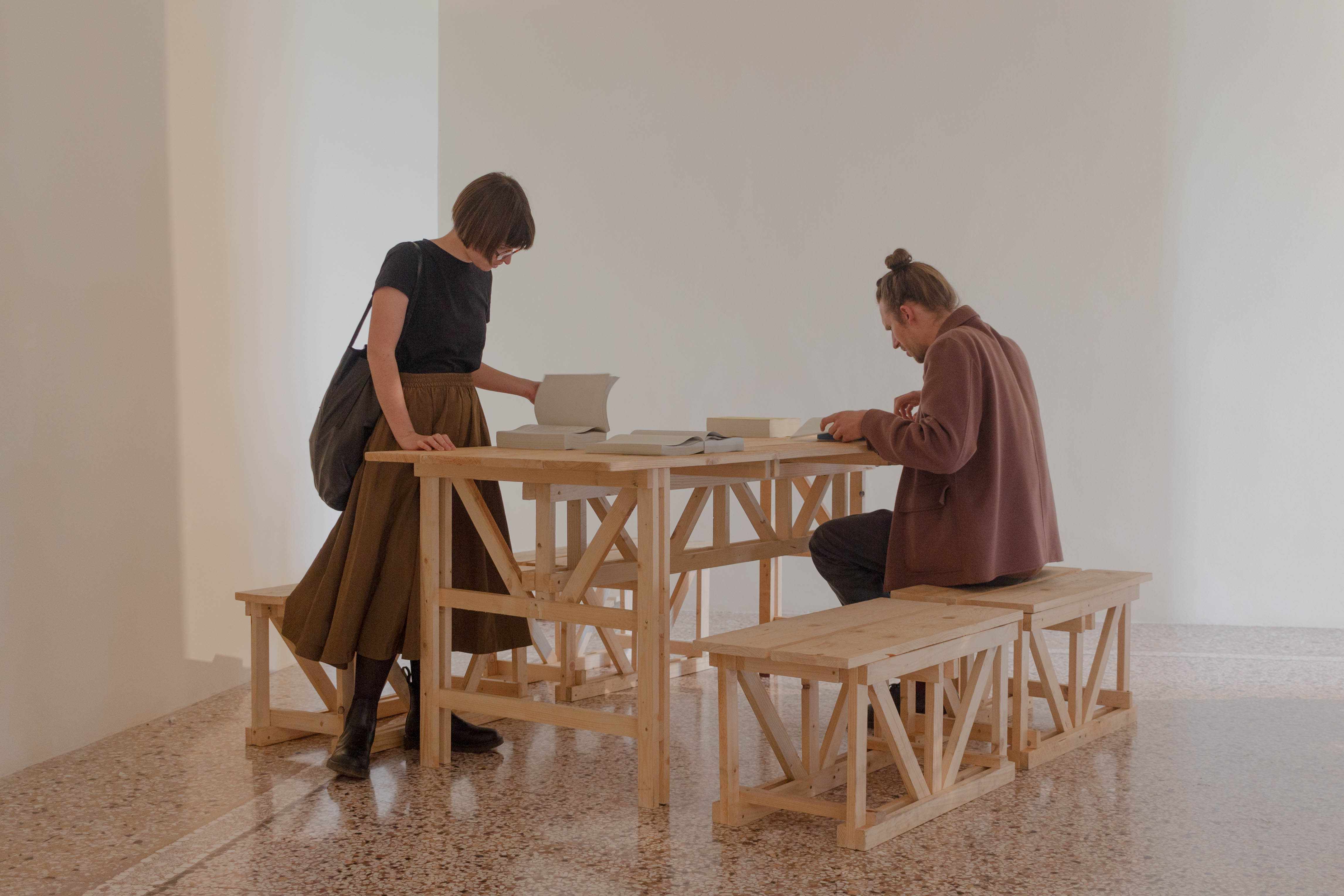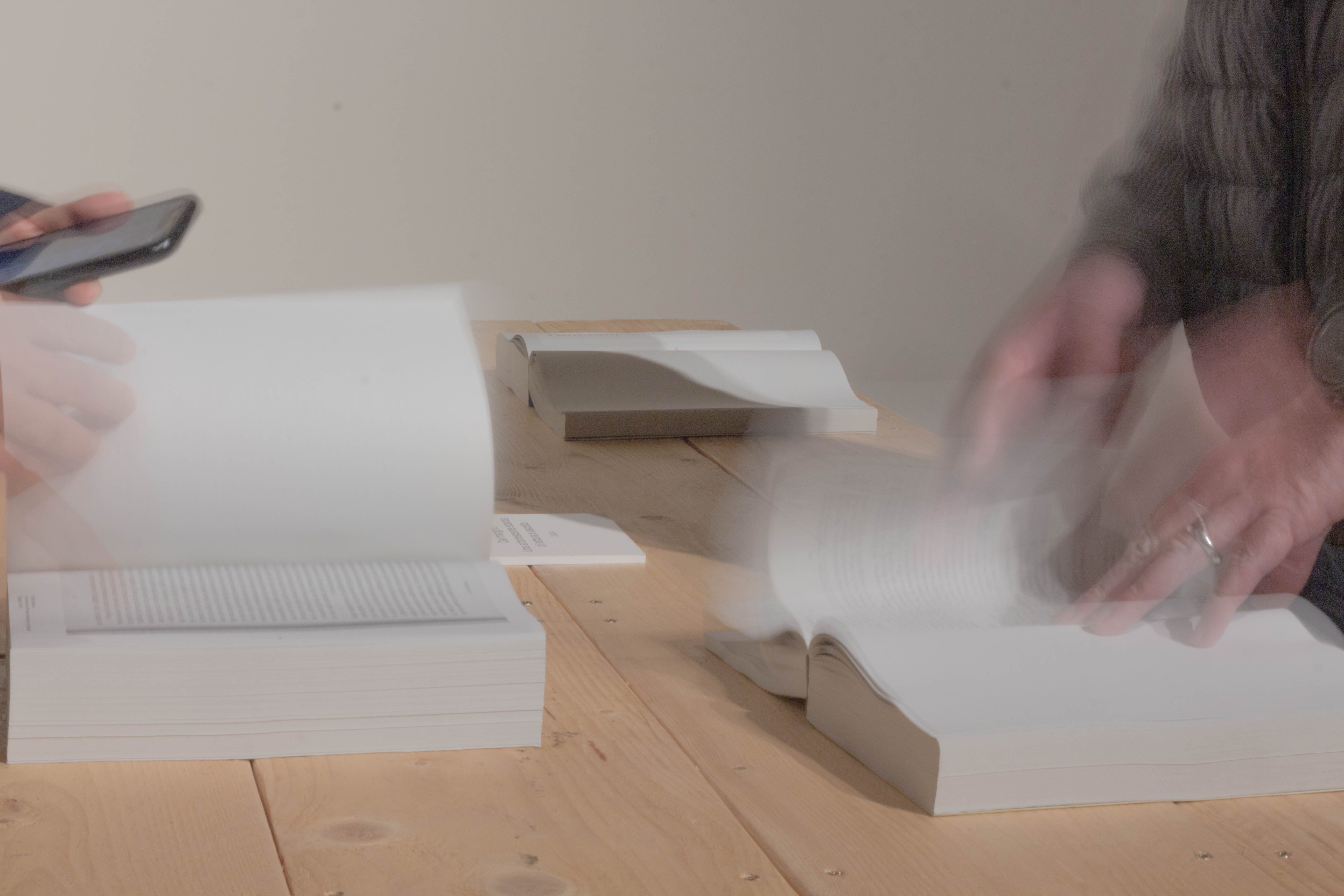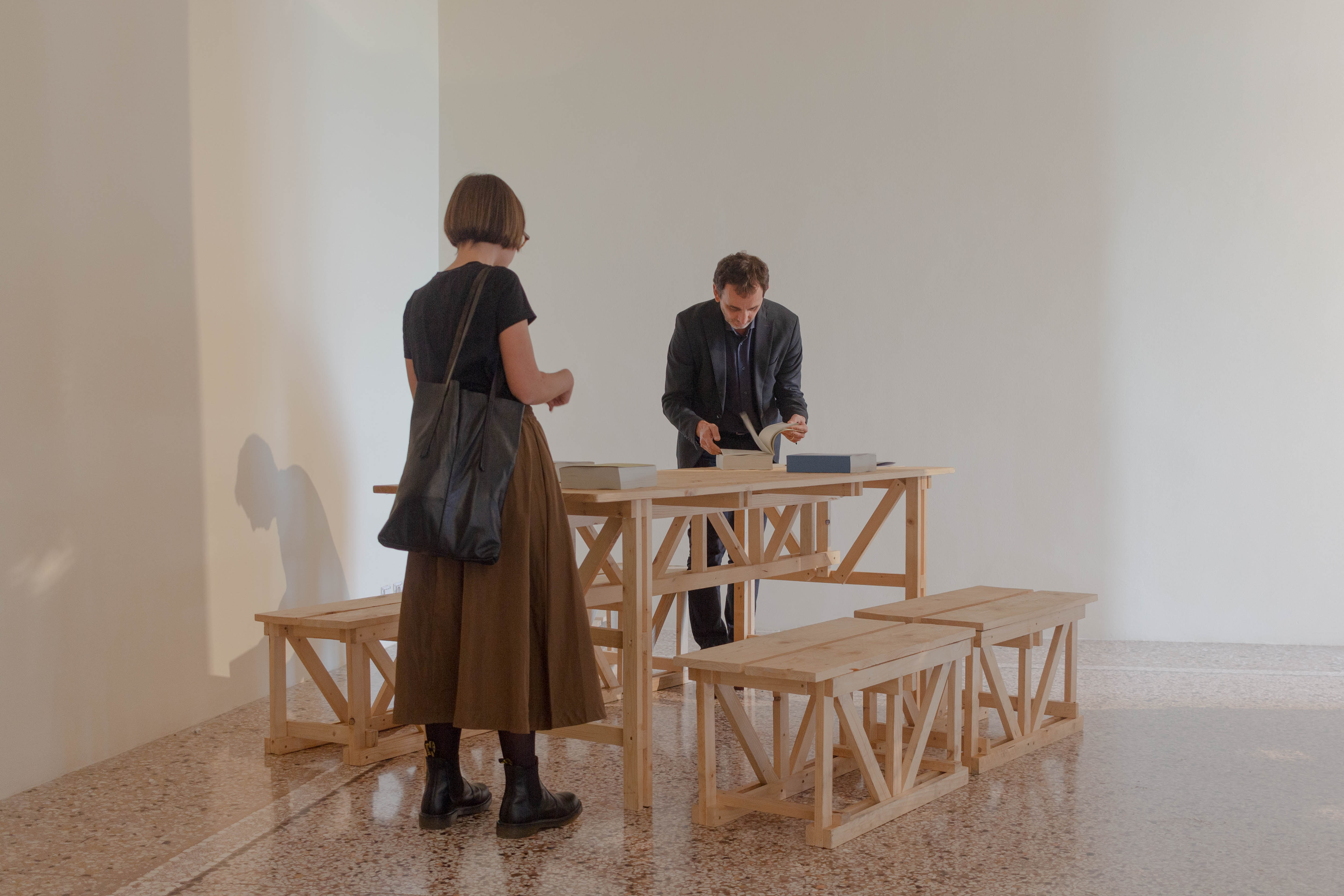From the Margins
An arborescent listening and reading room
From the Margins: An arborescent reading and listening room is an installation imagined by Robida Collective for the exhibition T3rza Terra: Michelangelo Pistoletto e Cittadellarte a Villa Manin in Codroipo (Udine).
It takes up some of the practices and themes that the collective explores from Topolò/Topolove (Grimacco), the village in which the collective is based. Nature/culture, individual/collectivity, centre/margins, rootedness/rootlessness are some of the main dichotomies of our time that are presented in a reader, audio piece and installation in their ramifications and are made porous to be finally deconstructed through a collection of texts read by a multiplicity of voices.
This reader offers multiple entry points into the rethinking of four binary oppositions: nature/culture, individual/collective, centre/margins, and rootedness/rootlessness and the borderlands between them. Each of these oppositions constitutes the (meta)physical tissue of Topolò/Topolove and all of the other places (re)configured throughout the process of Modernity. The purpose of this reader is not to dismantle borders between these terms but to make them porous. The border itself, if porous, unites, and creates affinities between the two sides. Therefore, this reader is an arborescent reader. More than articulating and hierarchising multiplicities we understand it functioning as a tree which simultaneously belongs to subterranean and heavenly realms. In this sense, to be arboreal mens to articulate opposing realities of light and dark, up and down. One and the other.
The question then emerges: How can we think of conceptual oppositions so as to let them intermingle, mix, or even hybridise? How might we imagine a world where borders remain, but are fluid, dynamic, and open to exchange? This reader provides insights and pathways toward exploring this porous borderful world.
Texts read by Vida Rucli, Elena Rucli, Antônio Frederico Lasalvia, Aljaž Škrlep, Dora Ciccone, Lijuan Klassen, Moritz Gansen, Rebeca Pérez Gerónimo, Jack Bardwell, Sophie Mak-Schram, Margherita Cogoi, Heike Renée de Wit and Sasha van Aalst.
NATURE/CULTURE
Does the tree remember the hand that grafted it?
Ours is a time of hybridity, where the sedimented categories of modernity are frequently called into question. When it comes to the human condition in the world, the problem with partitioning reality among things given and things made arises as soon as one asks about the precise limits between the natural and the artificial. How far do we have to look (in either time or space) in order to find nature unperturbed by culture, in its pure and spontaneous state?
The texts in this section bear witness to the quixotic character of such a task, which has been denounced by various disciplines in recent decades. To cite but a couple of examples familiar to the practices of Robida, we can think about emergent beings - assembled entities with behaviours and properties that its parts do not have on their own - such as honeybee colonies and fruit trees. When we look at their existence in time, we realise that the imbrication between different species did not only happen by the dead luck of evolution, but was also potentiated by artificial selection: this can be observed in the symbiotic relation between flowers and bees in the case of pollination, or in the interdependent affiliation between people and plants since the birth of agriculture. The following authors explore these (and other) perspectives on the compound character of being between notions of nature and culture.
- Bruno Latour, We Have Never Been Modern (Harvard University Press, 1993)
- Timothy Morton, Iperoggetti (Nero, 2018)
- Michael Pollan, The Botany of Desire: A Plant's-Eye View of the World (Random House Publishing Group, 2002)
- Michael Marder, The Philosopher's Plant: An Intellectual Herbarium (Columbia University Press, 2014)
- Eduardo Kohn, Come pensano le foreste. Antropologia oltre l'umano (Nottetempo, 2021)
- John Berger, Perché guardiamo gli animali? Dodici inviti a riscoprire l'uomo attraverso le altre specie viventi (Il Saggiatore, 2016)
- Eduardo Viveiros de Castro, Cannibal Metaphysics: For a Post-structural Anthropology (Univocal, 2014)
- Tim Ingold, “Culture, Nature, Environment: Steps to an Ecology of Life” in: Tim Ingold, The Perception of the Environment: Essays on Livelihood, Dwelling and Skill (Routledge, 2000)
- Gilles Clément, Manifesto del Terzo paesaggio (Quodlibet, 2016)
- Andreas Malm, The Progress of This Storm: Nature and Society in a Warming World (Verso Books, 2020)
INDIVIDUAL/COLLECTIVE
Where do I end and We begin?
We inhabit a society that is deeply atomised. But “one cannot make a world with simple atoms,” wrote Jean-Luc Nancy and added that for a world to be formed, “[t]here has to be an inclination or an inclining from one toward the other, of one by the other, or from one to the other.” During the summer, Robida Collective organises its Summer School of the Academy of Margins in Topolò, a gathering of artists, theoreticians and practitioners, aimed at developing and putting into action this swerving of individuals through the concept of learning-with. In learning-with, there is no call to order, no interpellation into teachers and students, no distinction between “activity” and “passivity”, spaces of study and spaces of mere being. The Summer School seeks neither to side with the individual nor the collective but rather to open up a space “where people sort of take turns doing things for each other or for the others, and where you allow yourself to be possessed by others as they do something.” Being possessed by others - their otherness and particular personalities, everyday practices, eating habits, choice of words - provides a way of forming a new possible subjectivity, which is now open to contaminations by other “individuals”, the environment, the landscape and its human and non-human inhabitants.
The following texts try to provide an insight into the whys and the hows of creating these contaminated subjectivities. They show us that we have never been anatomically, genetically, evolutionary, even ontologically individuals at all and that existence, meaning and worlding are not individual affairs. Becoming-with is rather a process “that places oneself at the edge of one's self and leaning and tipping toward the ‘others’ to whom you belong, or with whom you long to be — or those who are ‘you.’” (Aimee Carrillo Rowe). But most importantly: they convince us that the I is very little without the We.
- Karen Barad, Meeting the Universe Halfway (Duke University Press, 2007)
- Scott F. Gilbert, “Holobiont by Birth: Multilineage Individuals as the Concretion of Cooperative Processes” in: Anna Lowenhaupt Tsing, Nils Bubandt, Elaine Gan and Heather Anne Swanson (eds.), Arts of Living on a Damaged Planet. Ghosts and Monsters of the Anthropocene (University of Minnesota Press, 2017)
- Jane Bennett, Vibrant Matter: A Political Ecology of Things (Duke University Press, 2009)
- Manuel DeLanda, Assemblage Theory (Edinburgh University Press, 2016)
- J.K. Gibson-Graham and Ethan Miller, “Economy as Ecological Livelihood” in: Katherine Gibson, Deborah Bird Rose and Ruth Fincher (eds.), Manifesto for Living in the Anthropocene (Punctum Books, 2015)
- Jean-Luc Nancy, Singularna pluralna bit (KUD Apokalipsa, 2012)
- Aimee Carrillo Rowe, “Be Longing: Toward a Feminist Politics of Relation” in: NWSA Journal, Vol. 17, No. 2 (2005)
- Katherine McKittrick, Dear Science and Other Stories (Duke University Press, 2021)
- Giancarlo De Carlo, Sara Marini (ed.), L'architettura della partecipazione (Quodlibet, 2015)
- Jeanne van Heeswijk, “Preparing for the Not-Yet” in: Ana Paula Pais and Carolyn F. Strauss (eds.), Slow Reader: A Source for Design Thinking and Practice (Valiz, 2016)
- Gloria Anzaldúa, Borderlands/La Frontera: The New Mestiza (Aunt Lute Books, 1987)
- Unknown author, “Constellations” in: Friendship as a Way of Life (unknown publisher, unknown year)
CENTRE/MARGINS
Which is the language of the margins?
It takes two and a half hours by car to reach Venice or Ljubljana from Topolò. It takes just 30 minutes on foot to reach the border post with Slovenia. Where we are is not irrelevant. And we — Robida collective — are located in a beautiful place, surrounded by nature, which however in recent decades has seen a depopulation and displacement of people towards the city. What does it mean for us to live, work and imagine from such a remote place? A resistant, resilient, rooted, marginalised, difficult and at the same time surprising place. This specific place is for us the reason why we do what we do: we therefore do not distinguish what comes from outside or what is born from within. We like to bring theory to Topolò where once the meaning of life was linked to practical and manual work, and we put into practice what once could only be imagined. A place of possibility, of dynamism, of imagination.
And this place, by changing itself constantly, gives us the opportunity to change the way we look at things. Borrowing the words of Anna L. Tsing, the margin is a place "where contradictory discourses overlap, or where discrepant types of meaning-making converge". We are in a suspended space, a source of constant inspiration, which puts us in dialogue with contemporary theories but at the same time it is the same theories that enter and adapt to the landscape that surrounds us.
In this short collection of texts we want to give space to reflections that touch on different parts of what it means to find oneself, to think of oneself, to re-find oneself on the margins. Not only in geographical terms but also as a condition, imposed or desired.
The language that calls things, as they are or would like to be, is the first tool that allows us to bring about change. In no particular order, so as to dialogue and be contaminated, you will find reflections on colonialism, power, feminism and on the heterogeneity of marginality; reflections on abandoned places, on places of radical openness, places of possibility; on ecotones as places of diversity, combination, novelty and adaptation.
- Anna Lowenhaupt Tsing, “From the Margins” in: Cultural Anthropology, Vol. 9, No. 3, (1994)
- Antonella Tarpino, Spaesati. Luoghi dell'Italia in abbandono tra memoria e futuro (Einaudi, 2012)
- bell hooks, “Choosing the Margin as a Space of Radical Openness” in: Framework: The Journal of Cinema and Media, No. 36 (1989)
- Catriona Mortimer-Sandilands, “The Marginal World” in: J.A. Wainwright (ed.), Every Grain of Sand: Canadian Perspectives on Ecology and Environment (Wilfrid Laurier University Press, 2004)
- Katy Mahraj, “Dis/locating the Margins:Gloria Anzaldúa and Dynamic Feminist Learning” in Feminist Teacher, Vol. 21, No. 1 (2010)
- Shahram Khosravi, “A Stolen Lexicon” in: Decolonial Hacker (2024)
ROOTEDNESS/ROOTLESSNESS
How to branch out while being grounded?
Robida collective works in between scales. It actively collaborates with the tiny hyper-local community of Slovene people of Benečija, endangered by the loss of their mother/place tongue, and weaves relations with a wide internationally-spread group of co-thinkers. It produces editorial works from a very specific somewhere while reaching a broad community of readers. It is rooted, grounded and inspired by the place - its histories of resistance and its poetry - but also influenced by discourses that come from other territories. And so, how to stay in between this multiplicity of scales? The texts collected in this section try to propose some answers about the apparent double positioning of being rooted while expanding. Grounded while dispersed. Sedentary and moving.
From seminal texts such as “Situated Knowledges: The Science Question in Feminism and the Privilege of Partial Perspective” by Donna Haraway (1988) who writes about partial views and situatedness as feminist locations from where to produce knowledges, to recent texts such as “We are ‘Nature’ Defending Itself” by Isabelle Fremeaux and Jay Jordan (2021) that explore hyper-local activism and transformative imagination, the anthology that follows traverses translocality, rootedness, and groundedness from various geographies and stories, from the Zapatistas in Mexico to Russia, from resistance movements such as Occupy to the ZAD in France, to reach stories of restanza in Calabria, including also reflections around more-than-humans such as the radical sedentarity of plants or the sang territories of birds.
- Donna Haraway, “Situated Knowledges: The Science Question in Feminism and the Privilege of Partial Perspective” in: Feminist Studies, Vol. 14, No. 3 (1988)
- Vito Teti, Pietre di pane: un'antropologia del restare (Edizioni Quodlibet, 2011)
- Rosi Braidotti, “Sogjets Zingars” in: Usmis, No. 5 (1995)
- Vinciane Despret, “Ritornare alla terra con gli uccelli” in: Francesca Comisso, Luisa Perlo, Marianna Vecellio (eds.), Comp(h)ost: immaginari interspecie, (Nero, 2021)
- Michael Marder, “Resist Like a Plant! On the Vegetal Life of Political Movements” in: Piece Studies Journal, Vol. 5, No. 1 (2012)
- Isabelle Freneaux & Jay Jordan, We Are ‘Nature’ Defending Itself: Entangling Art, Activism and Autonomous Zones (Pluto Press, 2021)
- Walter Mignolo, Local Histories/Global Designs (Princeton University Press, 2000)
- Oxana Timofeeva, How to Love a Homeland (Kayfa ta, 2021)
- Femke Snelting, “Grounded” in: Janneke Wesseling and Florian Cramer (eds.), Making Matters: A Vocabulary for Collective Arts (Valiz, 2022)
The photos of the installation are by Antônio.
The tables and benches used for the exhibition were produced for POP Adriatico – Porto Osservatorio Partecipato, a project by Adriatico Book Club and Eterotopia that tackles the ongoing territorial transformations of the old port of Trieste through contemporary art and architecture. The tables and benches were bought by Robida in support to the activities of POP Adriatico after the municipality has rejected the request of continuing to use the spaces of the Varchi Monumentali of Porto Vecchio and keep them open for cultural activities after the official ending of the project. The tables and benches, after the end of the exhibition at Villa Manin, will find new public, common and shared use in Topolò/Topolove. Read more on POP Adriatico IG page (@popadriatico).
Dai margini
Una arborescente stanza di lettura e ascolto
Dai margini: una arborescente stanza di lettura e ascolto è un’installazione immaginata dal collettivo Robida per la mostra T3rza Terra: Michelangelo Pistoletto e Cittadellarte a Villa Manin a Codroipo (Udine) che riprende alcune delle pratiche e tematiche che il collettivo esplora da Topolò/Topolove (Grimacco), il paese nel quale il collettivo abita. Natura/cultura, individuo/collettività, centro/margini, radicamento/sradicamento sono alcune delle principali dicotomie del nostro tempo che sono qui presentate nelle loro ramificazioni e sono rese porose per essere infine decostruite attraverso una raccolta di testi letti da una molteplicità di voci.
Questa antologia offre molteplici punti di accesso alla riconsiderazione di quattro opposizioni binarie: natura/cultura, individuo/collettivo, centro/margini e radicamento/sradicamento e i confini tra di loro. Ognuna di queste opposizioni costituisce il tessuto (meta)fisico di Topolò/Topolove e di tutti gli altri luoghi (ri)configurati durante il processo della modernità. Lo scopo di questa antologia non è quello di smantellare i confini tra questi termini, ma di renderli porosi. Il confine stesso, se poroso, unisce e crea affinità tra le due parti. Pertanto, abbiamo chiamato questa pubblicazione “antologia arborescente”. Più che articolare e gerarchizzare molteplicità lo comprendiamo come un albero che appartiene simultaneamente ai regni sotterranei e celesti. In questo senso, essere arborei significa articolare realtà opposte di luce e oscurità, alto e basso. Uno e contemporaneamente altro.
Emerge quindi la domanda: come possiamo pensare le opposizioni concettuali in modo da lasciarle mescolarsi e persino ibridarsi? Come potremmo immaginare un mondo in cui i confini permangono, ma sono fluidi, dinamici e aperti allo scambio? Questa antologia fornisce spunti e percorsi per esplorare questo mondo poroso e pieno di confine (borderful).




